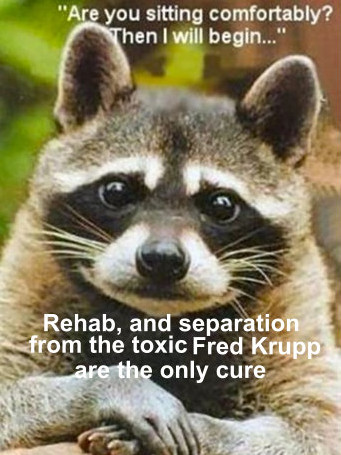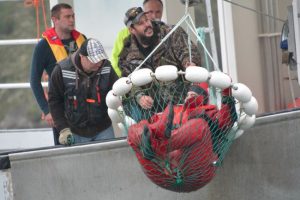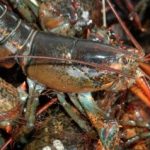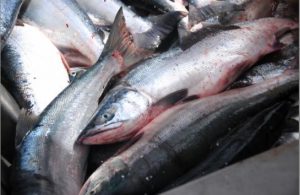Tag Archives: Catch Shares
Supporting responsible ocean management: Are ‘catch shares’ the right plan?
 Sadly, catch shares inherently divide fishermen into haves and have-nots. Initial quota allocations often go to people and companies that were already fishing, endowing them with a huge benefit for getting in the game early. As red snapper limits were set and reduced in the Gulf, small-scale fishermen often bore the brunt of the cost of managing the catch. Since the advent of the program, the number of entities-companies and private fishermen-in the industry is down 39 percent. Read the rest here
Sadly, catch shares inherently divide fishermen into haves and have-nots. Initial quota allocations often go to people and companies that were already fishing, endowing them with a huge benefit for getting in the game early. As red snapper limits were set and reduced in the Gulf, small-scale fishermen often bore the brunt of the cost of managing the catch. Since the advent of the program, the number of entities-companies and private fishermen-in the industry is down 39 percent. Read the rest here
Brokers say “slow going” for Halibut IFQs, catch shares; lots of buyers/few sellers
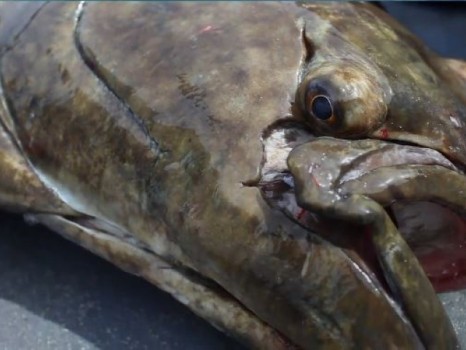 Right after the yearly catch limits are announced for halibut, brokers are busy with buying and selling shares of the catch. But it’s been slow going so far this year. Less of a rush this year, but there is less available. So I think the increases in 3A and 2C and the higher prices might bring out some more sellers, and of course the buyers are sitting there waiting. Listen, Read the rest here 16:50
Right after the yearly catch limits are announced for halibut, brokers are busy with buying and selling shares of the catch. But it’s been slow going so far this year. Less of a rush this year, but there is less available. So I think the increases in 3A and 2C and the higher prices might bring out some more sellers, and of course the buyers are sitting there waiting. Listen, Read the rest here 16:50
There’s a better solution to the problem of too few fish than privatizing the ocean. -The Right Catch of the Day
 Then an approach called “Individual Transferable Quotas” was implemented. Under this approach, each fisherman was awarded the right to catch a certain percentage of the total annual allowable catch, which was set each year. The idea was that if each fisherman owned a percentage share of the total, they would have a strong incentive not to overfish and destroy the fishery, since that would of course destroy the value of what they owned. This was supposed to protect the fishing ground, and also protect the economic security of individual fishing operators. Read the rest here 15:28
Then an approach called “Individual Transferable Quotas” was implemented. Under this approach, each fisherman was awarded the right to catch a certain percentage of the total annual allowable catch, which was set each year. The idea was that if each fisherman owned a percentage share of the total, they would have a strong incentive not to overfish and destroy the fishery, since that would of course destroy the value of what they owned. This was supposed to protect the fishing ground, and also protect the economic security of individual fishing operators. Read the rest here 15:28
Fishermen want larger limit for mackerel – Council wants Catch Shares as a condition
 In order to get the increase in trip limits, the fishermen may have to go along with a fishery management practice they have long opposed — catch shares. The Florida Keys Commercial Fishermen’s Association has staunchly opposed catch shares, arguing they are running smaller mom-and-pop fishermen out of business and giving greater allocations to large commercial fleets. They also create a market for people selling their allocations to the highest bidder. Read the rest here 09:03
In order to get the increase in trip limits, the fishermen may have to go along with a fishery management practice they have long opposed — catch shares. The Florida Keys Commercial Fishermen’s Association has staunchly opposed catch shares, arguing they are running smaller mom-and-pop fishermen out of business and giving greater allocations to large commercial fleets. They also create a market for people selling their allocations to the highest bidder. Read the rest here 09:03
South Atlantic Fishery Council credibility is at stake
 Last year, the South Atlantic Fishery Management Council made a big splash,,, The phrase “catch shares” is nowhere to be found in the document. Instead creative code-speak is used to describe the strategy throughout the document: “sector share management system,” “individual quota management system,” We’re shocked and disappointed to see the SAFMC depart so dramatically from the stakeholder-driven,,, Read the rest here 11:41
Last year, the South Atlantic Fishery Management Council made a big splash,,, The phrase “catch shares” is nowhere to be found in the document. Instead creative code-speak is used to describe the strategy throughout the document: “sector share management system,” “individual quota management system,” We’re shocked and disappointed to see the SAFMC depart so dramatically from the stakeholder-driven,,, Read the rest here 11:41
A Rosie Report! Observer program gets ‘sea legs’ as fisheries recover
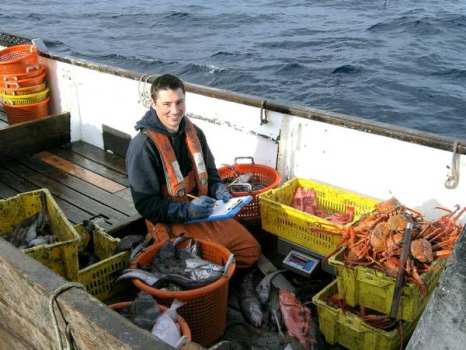 This summer, the alleged assault of a federal fisheries observer by a deck boss of a groundfish trawler from Astoria,,, Brad Pettinger, director of the Oregon Trawl Commission, called it a “renewal of the social contract that we have with the public.” Now, NOAA is juggling new questions ,, And observers, once viewed with distrust and even hostility, say their jobs have gotten easier. Read the rest here 18:00
This summer, the alleged assault of a federal fisheries observer by a deck boss of a groundfish trawler from Astoria,,, Brad Pettinger, director of the Oregon Trawl Commission, called it a “renewal of the social contract that we have with the public.” Now, NOAA is juggling new questions ,, And observers, once viewed with distrust and even hostility, say their jobs have gotten easier. Read the rest here 18:00
Fishing crisis only follows NOAA’s failed policies – Paul Cohan, Gloucester
![environmental-watchdog[1]](https://fisherynation.com/wp-content/uploads/2012/09/environmental-watchdog1.jpg) Weren’t NOAA’s “catch shares” and “sector management” strategies supposed to have been the panacea for the fishery? Weren’t they supposed to eliminate the widely acknowledged disparities between inshore and offshore, different gear types, big and little? Weren’t they supposed to eliminate the last vestiges of the failed Days At Sea management suite, with its associated trip limits, wasteful discards, and discriminatory spacial and temporal allocations? Read the rest here 13:49
Weren’t NOAA’s “catch shares” and “sector management” strategies supposed to have been the panacea for the fishery? Weren’t they supposed to eliminate the widely acknowledged disparities between inshore and offshore, different gear types, big and little? Weren’t they supposed to eliminate the last vestiges of the failed Days At Sea management suite, with its associated trip limits, wasteful discards, and discriminatory spacial and temporal allocations? Read the rest here 13:49
Gulf Council votes 10-7 in favor of Amendment 40 – 75 percent of gulf red snapper fishery would go to private businesses forever
 Thursday’s 10-7 vote by the Gulf Council favors a document referred to as Amendment 40, which would create rules for anglers fishing from charter boats that would be separate and different from rules that regulate anglers fishing from private boats for snapper in the Gulf of Mexico. Read the rest here 20:29
Thursday’s 10-7 vote by the Gulf Council favors a document referred to as Amendment 40, which would create rules for anglers fishing from charter boats that would be separate and different from rules that regulate anglers fishing from private boats for snapper in the Gulf of Mexico. Read the rest here 20:29
Global Ocean Grabs Privatize Oceans, Harm Fisheries, and Threaten Fishing Communities
 The report states, “Ocean grabbing is occurring mainly through policies, laws and practices that are (re)defining and (re)allocating access, use and control of fisheries resources away from small-scale fisheries and their communities, and often with little concern for the adverse environmental consequences.” Read the rest here 09:12
The report states, “Ocean grabbing is occurring mainly through policies, laws and practices that are (re)defining and (re)allocating access, use and control of fisheries resources away from small-scale fisheries and their communities, and often with little concern for the adverse environmental consequences.” Read the rest here 09:12
Tomorrow’s Catch: A Proposal to Strengthen the Economic Sustainability of U.S. Fisheries – Costello
 This proposal calls for an amendment to the Magnuson-Stevens Fishery Conservation and Management Act, the federal law currently guiding the management of U.S. fisheries, that would, for certain fisheries, require transparent comparison of the economic, social, and ecological trade-offs between status quo management and these alternatives. Read the rest here Full paper here 14:49
This proposal calls for an amendment to the Magnuson-Stevens Fishery Conservation and Management Act, the federal law currently guiding the management of U.S. fisheries, that would, for certain fisheries, require transparent comparison of the economic, social, and ecological trade-offs between status quo management and these alternatives. Read the rest here Full paper here 14:49
Catch Shares: Investment Firms are taking over the Fishing Rights

 What does it take to buy a share of the American ocean? Policymakers assured the nation that fishing rights would never migrate out of U.S. control through catch shares or end up as properties of investment firms. Environmental groups have similarly touted catch shares as a tool for communities and fishermen and overlooked the role investors can and do play. As the Snow’s deal now makes clear, those pacifications are baloney. Read the rest here 22:29
What does it take to buy a share of the American ocean? Policymakers assured the nation that fishing rights would never migrate out of U.S. control through catch shares or end up as properties of investment firms. Environmental groups have similarly touted catch shares as a tool for communities and fishermen and overlooked the role investors can and do play. As the Snow’s deal now makes clear, those pacifications are baloney. Read the rest here 22:29
The US Fishing Industry Contributes Nearly $90 Billion To The Economy

The Hamilton Project notes that “current policies do not capitalize on the full economic potential of U.S. fisheries, ( World Bank and EDF/Pew Nature Con have figured out how to skim the cream) nor do they guarantee their ecological sustainability.” (Because we know privatization saves not one fish!) Read more from the Vultures at the Hamilton Project, Making money the old fashioned way. Screwing people out of it! Read it here 19:54
Seth Macinko – Challenges facing small-scale fisheries – The Privatization Model, Ocean Grabbing
Rhode Island University Associate Professor Seth Macinko delivering his keynote speech to the delegates of the 6th World Forum of Fisher Peoples (WFFP) General Assembly. Published on Sep 2, 2014 09:34
Some Dangerous People will Assemble on September 10, 2014, and you should be aware of this.
 Casting the Net: A More Efficient Approach to U.S. Fisheries Management – The Brookings Institution – Former U.S. Treasury Secretary Robert E. Rubin will open the forum. discussion paper by economist Christopher Costello of the University of California, Santa Barbara, joined by Lee Crockett, Director of U.S. Oceans at the Pew Charitable Trusts; Amanda Leland, Vice President of Oceans at the Environmental Defense Fund; John Pappalardo, Executive Director of the Cape Cod Commercial Fisherman’s Alliance; and Captain Steve Tomeny of Steve Tomeny Charters. Read this. Read the rest here 20:22
Casting the Net: A More Efficient Approach to U.S. Fisheries Management – The Brookings Institution – Former U.S. Treasury Secretary Robert E. Rubin will open the forum. discussion paper by economist Christopher Costello of the University of California, Santa Barbara, joined by Lee Crockett, Director of U.S. Oceans at the Pew Charitable Trusts; Amanda Leland, Vice President of Oceans at the Environmental Defense Fund; John Pappalardo, Executive Director of the Cape Cod Commercial Fisherman’s Alliance; and Captain Steve Tomeny of Steve Tomeny Charters. Read this. Read the rest here 20:22
Prince Charles and his Privatization/Consolidation EDF Intoxication Situation.
Fish and Ocean Grabbing: The Case of Commercial Fisheries – prepared by Seth Macinko and Brett Tolley
 On April 8, 2009, a story in the New York Times quoted the administrator of NOAA (the federal agency in charge of managing OUR oceans) as saying that NOAA was “taking preliminary steps toward privatizing fisheries” (in New England). We submit that if the director of the Forest Service or the National Park Service or the Bureau of Land Management was quoted as saying those agencies were taking preliminary steps towards privatizing public forests, national parks, or public rangelands, that there would be an immediate outcry from “the left.” Read more here 17:04
On April 8, 2009, a story in the New York Times quoted the administrator of NOAA (the federal agency in charge of managing OUR oceans) as saying that NOAA was “taking preliminary steps toward privatizing fisheries” (in New England). We submit that if the director of the Forest Service or the National Park Service or the Bureau of Land Management was quoted as saying those agencies were taking preliminary steps towards privatizing public forests, national parks, or public rangelands, that there would be an immediate outcry from “the left.” Read more here 17:04
Banking on Wealth? by Menakhem-Ben Yami
 Current trends in Western fisheries economics, as exemplified by the position of the World Bank, religiously promote free markets for fishing rights During the last decade, the World Bank (WB) has been showing an increasing interest in world fisheries. In 2005, the WB, along with key donors and stakeholders, created the Global Program on Fisheries (GPO-PROFISH) and in 2009, to amplify its work in fisheries, another global partnership with the fishing industry, the Alliance for Responsible Fisheries (ALLFISH). Read more here 13:37
Current trends in Western fisheries economics, as exemplified by the position of the World Bank, religiously promote free markets for fishing rights During the last decade, the World Bank (WB) has been showing an increasing interest in world fisheries. In 2005, the WB, along with key donors and stakeholders, created the Global Program on Fisheries (GPO-PROFISH) and in 2009, to amplify its work in fisheries, another global partnership with the fishing industry, the Alliance for Responsible Fisheries (ALLFISH). Read more here 13:37
Fishermen get that sinking feeling: New industry plans could squeeze out smaller family-owned operators
 “Why do they have to get rid of small businesses just to make room for big business?’’ he said. “They do it with everything — look at the farms.’’ Australian Marine Alliance board member and fifth-generation commercial fisherman Jason Davidson said fishermen fear a plan to consolidate the industry and reduce latent shareholders will squeeze out smaller family-owned operators and open the gates for foreign ownership. Read more here 16:53
“Why do they have to get rid of small businesses just to make room for big business?’’ he said. “They do it with everything — look at the farms.’’ Australian Marine Alliance board member and fifth-generation commercial fisherman Jason Davidson said fishermen fear a plan to consolidate the industry and reduce latent shareholders will squeeze out smaller family-owned operators and open the gates for foreign ownership. Read more here 16:53
Special Report – Catch Shares: Too often we call the devil by a different name – by Evan Connoly ACFN Contributor
 It was a strange sight to see, and one I had not since my childhood. Plymouth Rock loomed majestically over the ocean in the morning sun beside the town’s historic waterfront. Cold and raw; both the day and the feeling in my gut the more I learned about the changes in this town. The streets felt as though they were dying. American sweat and blood now trickled only thinly across those historic streets. In Plymouth I met with a group of men who remain fishing in the area, Read more here 08:39
It was a strange sight to see, and one I had not since my childhood. Plymouth Rock loomed majestically over the ocean in the morning sun beside the town’s historic waterfront. Cold and raw; both the day and the feeling in my gut the more I learned about the changes in this town. The streets felt as though they were dying. American sweat and blood now trickled only thinly across those historic streets. In Plymouth I met with a group of men who remain fishing in the area, Read more here 08:39
In the Guest Writers Column, Jay Andersson – The Reasons For The New England Groundfish Collapse Are An Inconvenient Truth For Regulators
 As federal disaster funds roll into New England and hopeful recipients line up to fight for what amounts to pennies on the dollar for the investments and livelihoods lost, the regulatory blunders that caused this crisis are being swept under the rug. The sad premise that individual ownership of the fish in the sea is a cure-all for fishery managment issues has been exposed for the lie that it always was, yet the issues caused by introducing this new system of effort controls for New England groundfishing remain unaddressed by bumbling regulators who seem to be unwilling to admit that sector allocations have been a dismal failure and cause more problems than they solve. Read more here 08:54
As federal disaster funds roll into New England and hopeful recipients line up to fight for what amounts to pennies on the dollar for the investments and livelihoods lost, the regulatory blunders that caused this crisis are being swept under the rug. The sad premise that individual ownership of the fish in the sea is a cure-all for fishery managment issues has been exposed for the lie that it always was, yet the issues caused by introducing this new system of effort controls for New England groundfishing remain unaddressed by bumbling regulators who seem to be unwilling to admit that sector allocations have been a dismal failure and cause more problems than they solve. Read more here 08:54
So how’s that “catch shares” revolution working out for groundfish?
“Recent scientific analyses show us that fisheries managed with catch share programs perform better than fisheries managed with traditional tools. Even in the first years after implementation, catch share fisheries are stable, and even increase their productivity. The scientific evidence is compelling that catch shares can also help restore the health of ecosystems and get fisheries on a path to profitability and sustainability. These results, … these scientific analyses, … are why moving forward to implement more catch share programs is a high priority for me. I see catch shares as the best way for many fisheries to both meet the Magnuson mandates and have healthy, profitable fisheries that are sustainable.” (Former NOAA Administrator Jane Lubchenco to the New England Fishery Management Council pressing for catch share management in the New England groundfish fishery in Boston on May 19, 2009) Read more@Fishosophy
A cautionary tale about ITQ fisheries
 Individual transferable quotas (ITQs) are being promoted as a panacea for global fisheries. However, analysis of BC fisheries raises serious questions about this new economic approach. Read more@ecotrust 13:08
Individual transferable quotas (ITQs) are being promoted as a panacea for global fisheries. However, analysis of BC fisheries raises serious questions about this new economic approach. Read more@ecotrust 13:08
With elver season at risk, Maine moves closer to deal with Indian tribes
The state and Maine’s Indian tribes are approaching a deal that would effectively allocate part of the lucrative elver fishery to the tribes, defusing tension that arose last year but creating separate regulations for tribal and non-tribal fishermen. Read more@portlandpress 09:50
Catch Shares – BJ Brown Summed Up What Was Going To Happen In The Fishing Industry In Gloucester 4 Years Ago
 This was filmed in 2010 and it’s only gotten worse. What he predicted back in 2010 is about 10 times worse 4 years later. As I type this a fisherman just left my office. He is 52 years old and has fished his whole life. He is a stern man meaning he has no stake in what the owner of the boat may receive when he sells out his commercial fishing permits. He has only seen it get worse and worse and was telling me he has absolutely no idea what he could do for a living since all he knows is fishing. It’s sad and it is despicable what they did when they instituted Catch Shares and privatized the ocean and fish. Read more@goodmorninggloucester 21:47
This was filmed in 2010 and it’s only gotten worse. What he predicted back in 2010 is about 10 times worse 4 years later. As I type this a fisherman just left my office. He is 52 years old and has fished his whole life. He is a stern man meaning he has no stake in what the owner of the boat may receive when he sells out his commercial fishing permits. He has only seen it get worse and worse and was telling me he has absolutely no idea what he could do for a living since all he knows is fishing. It’s sad and it is despicable what they did when they instituted Catch Shares and privatized the ocean and fish. Read more@goodmorninggloucester 21:47
Back in 2009 I started to collect the stories and add them to a thread on Cape Ann Online as sort of a journal and record for those who might have said they didn’t see this coming. There are three pages of articles from fishermen and about how it was and has decimated our working port and independent fishermen. Click here for the list of articles (3 pages worth)
Masifundise supports a fisheries allocation process that benefits those most in need
 We ran this on Jan. 7th, Many small-scale fishermen are threatening to turn to organised crime in order to sustain their families. This is a follow up article from Masifundise – Masifundise supports a fisheries allocation process that benefits those most in need. The furore around the line fish allocations is still raging, even after government granted interim relief to previous rights holders. As an organisation that works with thousands of small-scale fishers around the country, we need to offer a few critical comments on this matter. Read [email protected] Special Thank’s to Carsten Pederson 12:54
We ran this on Jan. 7th, Many small-scale fishermen are threatening to turn to organised crime in order to sustain their families. This is a follow up article from Masifundise – Masifundise supports a fisheries allocation process that benefits those most in need. The furore around the line fish allocations is still raging, even after government granted interim relief to previous rights holders. As an organisation that works with thousands of small-scale fishers around the country, we need to offer a few critical comments on this matter. Read [email protected] Special Thank’s to Carsten Pederson 12:54






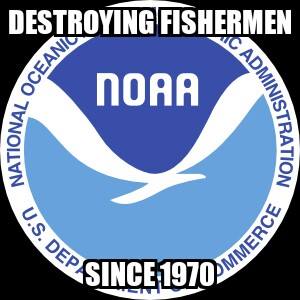 NOAA has spent about $160 million over the last six years pushing its national catch share policy in an effort to privatize fisheries by giving commercial fishermen “shares” in fisheries based on catch history, which can be bought and sold like shares on Wall Street. Catch share programs tend to benefit large corporate fleets that can buy up shares and hurt small fishermen who cannot. Studies have shown that catch share programs hurt fishing communities by destroying jobs, and don’t provide any biological benefit to fisheries.
NOAA has spent about $160 million over the last six years pushing its national catch share policy in an effort to privatize fisheries by giving commercial fishermen “shares” in fisheries based on catch history, which can be bought and sold like shares on Wall Street. Catch share programs tend to benefit large corporate fleets that can buy up shares and hurt small fishermen who cannot. Studies have shown that catch share programs hurt fishing communities by destroying jobs, and don’t provide any biological benefit to fisheries. 
